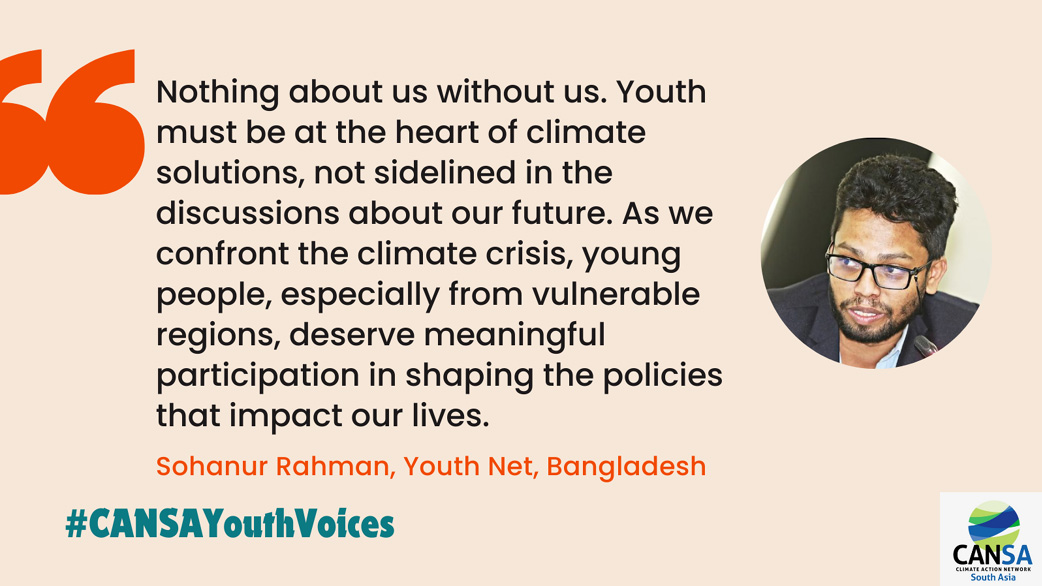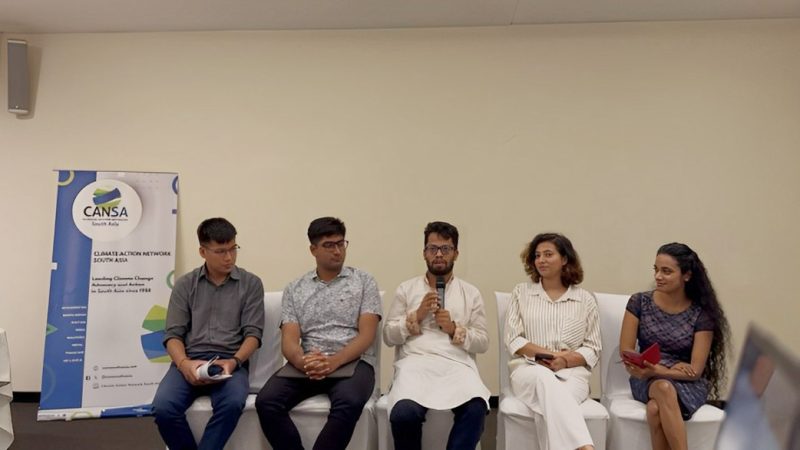Meet Sohanur Rahman: Inspiring Youth Climate Activist at the CANSA Annual Regional Meeting in Colombo


The CANSA Annual Regional Meeting 2024, held in Colombo, Sri Lanka, was a pivotal moment for climate action in South Asia, with over 40 delegates, including an inspiring number of youth leaders from across the region, gathering to address key issues like loss and damage, urban resilience, and climate finance. Marking a shift towards youth-driven activism, this year’s meeting emphasised intergenerational solidarity and the importance of youth in leading climate solutions. Key discussions included #ModernSlavery‘s connection to #ClimateChange, the ongoing execution of the CANSA #ColumboStrategy, and the significance of ensuring climate justice and equity for marginalised communities.
At the CANSA Annual Regional Meeting in Colombo, five remarkable #Youth climate activists took the stage to share their inspiring work, highlighting their unique contributions to climate action across South Asia.
Sohanur Rahman’s Advocacy for Climate Justice in Bangladesh
Organisation- Youth Net, Bangladesh
Sohanur Rahman, a prominent climate activist from Bangladesh, shared the journey of Youth Net for Climate Justice and the challenges young people face in the climate space. He emphasised the importance of youth representation in global platforms like COP, highlighting the slogan “nothing about us without us.” While policymakers discuss the future and negotiate #ClimateSolutions, youth are often excluded from meaningful participation.
Sohanur explained that YouthNet was founded in 2016 after witnessing the devastating impacts of climate change on a coastal community in Bangladesh. The organisation brought together government officials, academicians, NGOs, and youth to develop a youth declaration, which was then presented to the parliamentary group. This marked a significant step in amplifying the voices of young people in Bangladesh’s climate discourse. YouthNet also became part of the Fridays for Future movement, leading climate strikes in Bangladesh. One of their key victories was the Bangladesh Parliament’s acknowledgement of the climate emergency and the youth’s role in the climate movement.
However, Bangladesh’s continued reliance on coal-based power plants remains a challenge. Sohanur recounted a campaign where activists dressed as the popular cartoon character Pikachu protested Japan’s funding of a coal-based power plant Matarbari in Bangladesh. The campaign gained widespread media attention and eventually led to Japan withdrawing its funding. This victory was a testament to the power of youth-led movements in influencing policy decisions.
As a #ChildRights organisation, there is a recognised urgency to address the impact of climate change on children’s health, education, and livelihoods, particularly in vulnerable regions. Ensuring meaningful participation of children and youth in climate action is deemed essential, with civil society organisations (CSOs) playing a pivotal role in amplifying their voices and providing the necessary support for their engagement.
He also highlighted the challenges young activists face in gaining access to international platforms like COP. Securing badges, sponsorships, and visas remains a constant struggle for youth from the Global South.
In conclusion, Sohanur urged for greater support and representation for young people, particularly from South Asia, in global climate platforms. He called for government initiatives to officially include youth in climate delegations and emphasised the need for collaboration between countries like India, Nepal, Bangladesh, Pakistan, and Sri Lanka to strengthen regional youth climate movements.
By Divyanshi Yadav, Communications Officer, CANSA
#ChildRights #ClimateChange #ClimateSolutions #ColomboStrategy #ModernSlavery #Youth





